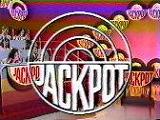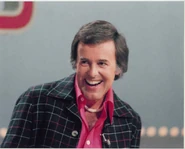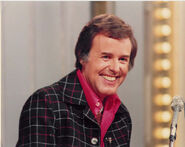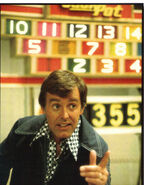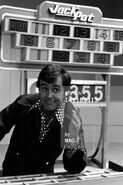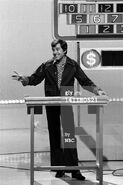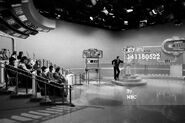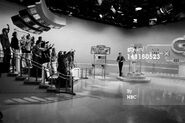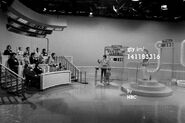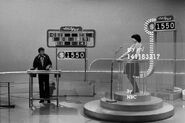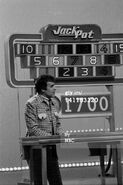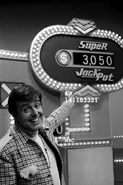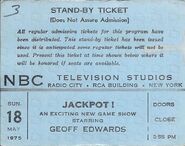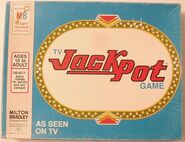| Hosts | |
| Geoff Edwards (1973–1975, 1989–1990) Nipsey Russell (1984) Mike Darow (1985–1988) | |
| Announcers | |
| Don Pardo (1974–1975) Wayne Howell (1975) Johnny Gilbert (1984, 1989–1990) Ken Ryan (1985) John Harris (1985–1988) John Harlan (1989–1990) | |
| Broadcast | |
| NBC Pilot: Late 1973 NBC Daytime: 1/7/1974 – 9/26/1975Unsold Pilot for CBS: 6/9/1984USA (Daily): 9/30/1985 – 12/30/1988Syndication (Daily): 9/18/1989 – 3/16/1990 | |
| Packagers | |
| Bob Stewart Productions (1974–1975) Global Television Network/Bob Stewart Cable/USA Network (1985–1988) Bob Stewart-Sande Stewart Productions Reeves Entertainment Group (1989–1990) | |
| Distributor | |
| Palladium Entertainment/Syndicast (1989–1990) | |
Jackpot (!) was a game show where sixteen contestants asked and answered riddles to win thousands of dollars in cash and prizes.
Gameplay[]
Basics[]
Sixteen contestants competed for an entire week, with one standing at a circular podium at stage-left. The other fifteen contestants were numbered and seated in three-tiered bleachers. Each had a special wallet containing a riddle and a cash amount (always a multiple of $5) or the Jackpot Riddle. The contestant at the podium selected a number from 1 to 15, and the contestant with that number revealed his/her cash amount and then read a riddle to that player. If answered correctly, the controlling player continued picking numbers; if answered incorrectly, the two contestants switched places, with the contestant who stumped him/her taking control.
The value of the riddle increased the value of the Jackpot. If the player in control chose the contestant with the Jackpot Riddle (one per game) he/she could go for it or play on to continue to build the Jackpot. When going for the Jackpot, if the player in control answered it correctly, these two contestants split the Jackpot; otherwise, it carried over to the next game until won.
If the last three digits of the Jackpot amount matched a pre-selected target number (up to $995), the player in control would have a chance to win a "Super Jackpot" by correctly solving another riddle. If it was answered correctly, he/she split the Super Jackpot with the bleacher contestant who posed the riddle that brought the Jackpot amount to the target number.
The largest Super Jackpot won in the show's history was $38,750, split between two players on an episode of the NBC version that aired in 1975. However, in an interview with Geoff Edwards on BlogTalkRadio, there was a rumor that someone actually managed to win $50,000; no proof of it has been given.
Special riddles[]
- Double Dollars (Syndicated version) – As the name implied, a correct answer to one of these riddles doubled the amount in the Jackpot at that time.
- Instant Target Match (Syndicated version) – If this riddle was answered correctly, the Jackpot would be automatically increased to match the target number, thus allowing a chance at the Super Jackpot Riddle.
- Bonus Prize (All three versions) – A correct answer won the controlling player a prize.
- Return Trip (USA and Syndicated versions) – Correctly answering this riddle allowed the controlling player (and the gallery player in syndication) to compete in an extra week of shows.
All weeks were self-contained, meaning that a game in progress on Friday couldn't continue into the following Monday. When time was called in the middle of a game on Fridays, the Jackpot riddle had to be played immediately (referred to by Geoff as an "Automatic Jackpot").
NBC version (1974–1975)[]
- In this version, the controlling player was called the "Expert", with the dollar amounts ranging from $5 to $200.
- To determine the value of the Super Jackpot, a number from 5 to 50 (in increments of 5) was chosen at random and was multiplied with the target number to make the Super Jackpot (e.g.: $500 × 30 = $15,000); if the target number was $995 and the multiplier read "50", the Super Jackpot was automatically set at $50,000; Bob Stewart Productions simply threw in the extra $250. Edwards would occasionally read a disclaimer (due to long-standing game show federal laws) to explained this change in the rules.
- The Super Jackpot could be played for in one of two ways:
- In the earliest episodes, if a player solved the Jackpot riddle when the last three digits of the Jackpot amount matched the target number, the Super Jackpot was won. This was later changed to having the Expert answer a Super Jackpot Riddle posed by Edwards in order to share the Super Jackpot with the gallery player (analogous to a traditional game show bonus round).
- Choosing the player with the Super Jackpot Wildcard and correctly answering the Super Jackpot riddle as posed by Edwards.
There were four other changes made when the Super Jackpot rule changed:
- Originally, the player who answered the most riddles in the week won a car; this was later dropped, and instead a car was given to any player who correctly answered all 15 riddles in the same game.
- The Super Jackpot Wildcard originally appeared at least once per week, but was soon altered to appear at least once in every ten shows.
- After a week-long experiment in February 1974 (when it was called The Valentine Riddle), most games had a Double Bonus riddle which, if answered correctly, won the two players involved a trip, usually to somewhere in Mexico or the Caribbean.
- The randomness of the multiplier changed; each number from 5 to 50 had an equal chance, except that 15 and 20 were twice as likely as the others.
This version was produced at the NBC Studios in New York City. Don Pardo served as announcer during this period.
Visually, the NBC version of the show became most noteworthy for the casual style of dress worn by both contestants and host Edwards, who frequently wore leisure suits, turtleneck sweaters, and open-collared shirts. Edwards' clothing choices represented a radical departure from the typical attire of male television hosts, who almost always wore business suits previously.
Jackpot broke several stylistic conventions that had marked the genre since its inception in the early 1950s. Contestants on this show were more likely than not to embrace each other (in the center of the stage, regardless of gender) after winning, instead of the customary handshake on other shows. NBC and executive producer Stewart apparently also encouraged studio audience members to scream and applaud in a louder-than-normal fashion. Touches like these helped market the program to a demographic of younger women and teenagers.
The show marked Don Pardo's final appearance as a regular game show announcer. He had done games since the pioneering Winner Take All in 1952, which was also the first game hosted by Bill Cullen. Some months after Jackpot was cancelled, he would emerge on the weekly comedy-variety series Saturday Night Live, until his retirement in 2010 (although he still pre-recorded material for the latter show at his Phoenix, Arizona home until his death). He would not appear on another game show until the fall of 1988, when he announced on Wheel of Fortune for two weeks' worth of episodes taped at New York's Radio City Music Hall.
Changes[]
For the last 13 weeks, the format was altered, with these changes:
- The Target number was dropped, and the Super Jackpot was established at random by the Expert pressing a button; it could be worth anywhere from $2,000 to $10,000 (in $100 increments).
- Riddles were dropped in favor of straight general-knowledge questions.
- When the Jackpot question was found, the Expert could either answer it or go for the Super Jackpot by answering all remaining questions in the game, including the Jackpot question. If he/she missed any of the remaining questions, the Jackpot was wiped out (making it hard to build a Jackpot), and a new Super Jackpot was established. If, however, the Jackpot question was the last one found, the Super Jackpot was lost.
Geoff Edwards, who worked closely with Stewart, once said that he and Stewart sat outside the NBC Rockefeller Studios dismayed following the format change, both believing that the series was at this point on its final legs.
NBC staff announcer Wayne Howell often filled in for announcer Don Pardo.
Canadian/USA Network version (1985–1988)[]
- The controlling player was now called the "King of the Hill" ("Queen of the Hill" for female contestants). This title would carry over to the syndicated version.
- The riddles and the Target number returned, but there was no multiplier; the Super Jackpot was created at random. The target number (as in the original) was notified by the last three digits of the current Jackpot total. The contestant whose riddle caused the target number to be hit asked his/her own riddle instead of the host. Super Jackpots ranged from $4,000 to almost $10,000 (in $100 increments); the highest was $8,200.
- The Jackpot started at $100, while the dollar amounts ranged from $50 to $300.
- If the Jackpot riddle was found and attempted, the King/Queen of the Hill and the person with the Jackpot riddle had to trade places regardless if the riddle was answered correctly or not. This rule would carry over into the syndicated version.
- If the Jackpot riddle was not found until the last player, an extra $1,000 was added to the Jackpot.
- Beginning in Season 2 and Continuing in Season 3, there were two 10-week "$10,000 Riddler Contests" during each of those two seasons in which a player who correctly answered the most riddles in a single week during that time won a $10,000 bonus, with tied players splitting the money. The winners of this bonus have included Bob Hultquist of Belleville, ON, Rodney Graham and Linda Cottrill.
- For the final six weeks of both of these seasons, there was a third Riddler Contest, where the player who answered the most riddles correctly in a single week during that time won a European vacation and $1,000 in spending money. The winner of this bonus included Brett Martin, who three years later was the runner-up finalist on The $40,000 Chain Reaction but won a total of $8,400 in his appearances on that show.
- In the final season of this version, there was a special "$50,000 Riddle". These were considerably harder than the ones usually asked, and all players who answered them correctly split $50,000 at the end of the season. Three contestants answered this riddle correctly during the season and those people were David Forster, Kagey Gray and Kathy O'Sullivan.
- Starting in Season 2 (and just like the original), any player who ran the board (answered all fifteen riddles without a miss) won a new car (usually a Hyundai Excel 2-door hatchback).
Syndicated version (1989–1990)[]
- In this version, the dollar amount was only added to the Jackpot if its riddle was answered correctly (unlike before, when it was always added even if the controlling player answered incorrectly).
- The Super Jackpot Riddle returned, but now either the King/Queen of the Hill or the bleacher contestant who asked the riddle that brought the Jackpot amount to the target number could respond. If either player was correct, they split the Super Jackpot. Unlike prior versions, the Super Jackpot could be won more than once in the same game.
- If the King/Queen of the Hill "ran the table" (answered all fifteen riddles without a miss), $1,000 was added to the Jackpot.
- Super Jackpots on this version ranged from $10,000 to $25,000 (in $500 increments), while riddle values ranged from $50 to $200.
Pilots[]
1977: The Riddlers[]
- Main article: The Riddlers
Two years after Jackpot ended, Bob Stewart produced two pilots involving riddles called The Riddlers with David Letterman, then still known as a stand-up comedian, as host. The basic format had five civilian contestants who shared a common occupation competed against five celebrities for an entire week. Letterman would read the first riddle of the day to the team who lost the previous game (or if it were the first show of the week, the civilians). A correct answer allowed the first player on that team to ask a riddle to the next person and then on down the line and back. If a mistake was made, control went to the other team and the process was repeated. The first team to answer nine riddles won the game, $500, and a chance for an additional $2,000.
In the Crazy Quotes end game, the winning team had to answer increasingly difficult questions (all quotes supposedly said by famous people) for $100, $200, $300, $400, and $1,000 respectively.
The celebrities for Pilot #1 were Jo Anne Worley, Robert Urich, Joyce Bulifant, Michael McKean, and Debralee Scott. Both pilots were produced at the NBC Studios in Burbank, the first such project ever produced on the West Coast by Bob Stewart Productions.
Game Show Network aired Pilot #1 (taped November 4, 1977) on Thanksgiving Day 1998 and October 28, 2000.
1984[]
On June 9, 1984 a pilot was produced for CBS with Nipsey Russell as host. In this version, the Jackpot started at $150, and that amount was added to the Jackpot for each riddle answered correctly (doubled to $300 for every riddle answered correctly if the Jackpot riddle was found, but the King/Queen of the Hill (a title previously used in another Stewart pilot called Twisters) opted not to go for it immediately). There was no Super Jackpot in this version. If the King/Queen found the Jackpot riddle last, an additional $5,000 was added to the Jackpot.
The winning players (the King/Queen of the Hill and the player who posed the Jackpot riddle) played a bonus round called "Riddle-Grams", which was played like Stewart's 1977 game show Shoot for the Stars (in fact, both Stars and this pilot's bonus round would later become the 1986 short-lived Bob Stewart-produced ABC game Double Talk). The contestants had 60 seconds to solve seven word puzzles known as "riddle-grams" (ex.: "Freezing Dollars", which would be a "riddle-gram" for "Cold Cash"). Each correct answer was worth $100, and successfully solving all seven split $5,000 between the two players ($2,500 per player). This pilot was the only attempt to add a (regular) bonus round to the show's format.
A home player format was added as well: Viewers were to send in postcards with the number of the person with the Jackpot riddle. At the end of the show, Nipsey would draw from bowls marked with the correct numbers, and those viewers won $500 each.
Although this pilot didn't sell in the States, its format was later tweaked and used in Wales (see "International Versions" section for details).
Nipsey's Poems[]
"They just made a movie about a mermaid,
I don't understand the reason why.
She's not enough woman to make love to,
And too much fish to fry!"
NOTE: At the time, this poem mostly referred to the movie Splash (not to be confused with the short-lived 2013 reality competition series on ABC of the same name) starring Tom Hanks and Daryl Hannah who plays Allen Bauer and Madison respectively. The film was originally released on March 9, 1984.
"If they don't walk and talk by the time they are two,
We worry, we fret and we frown.
But after that time, is all we can do
To make them shut up and sit down!"
"Said Mr. Rabbit to Mrs. Rabbit,
This lovin' ain't nothing but a habit!
Said Mrs. Rabbit to Mr. Rabbit,
Shoot the habit to me Rabbit!"
RUSSELL: "It's been a lovely day,
We had a lot of fun!
We gonna crawl into the oven,
and hope you'll say…
CONTESTANTS:…WELL DONE!"
International Versions[]
A Brazilian version under the name Clube dos Quinze (Club of Fifteen), hosted by Silvio Santos, aired on TV Globo in 1975 before moving to Tupi in 1976.
A Welsh version on S4C (entitled Jacpot)[1]aired from 1993 until 1999 with Kevin Davies (No relation to Michael Davies) as host. Twelve years later, it was eventually revived in 2012 as a segment on the Friday night magazine show Pen8Nos, with Rhordi Ogwen as host. As mentioned above, this version's format was similar to the 1984 pilot, albeit with tweaked rules; the most obvious difference that it used being straight-forward general knowledge questions instead of riddles (possibly because riddles are difficult to translate in Welsh).
Galleries[]
Press Photos[]
$50,000 Riddle Check[]
Tickets[]
Trade Ads[]
Merchandise[]
Milton Bradley made only one edition in 1974 under the name TV Jackpot Game, but with two different covers: one with just the logo, while the other has a drawing of an excited female contestant on the cover. Other than that, the gameplay remains the same in both boxes as it plays very similar to the 1980s Darow format.
Studios[]
NBC Studios, New York City, NY (NBC Version)
CBS Television City, Hollywood, CA (CBS Pilot)
Global Television Studios, Toronto, ON (USA Version)
Glendale Studios, Glendale, CA (Syndicated Version)
Rating[]
Music[]
1974–1975 – "Jet Set" by Mike Vickers (later used as the opening theme for This Week in Baseball)
1984 Pilot – "Spring Rain" by Bebu Silvetti (Originally used on The Love Experts hosted by Bill Cullen in 1978 also used on unsold pilots called Mind Readers and Famous Last Words... both hosted by Edwards in 1978 & 1983 respectively.) In Spanish, it's known as "Lluvia de Primavera".
1985–1990 – Bob Cobert (Originally used on Shoot for the Stars a.k.a. Shoot the Works in the pilot)
The intro to the 1970s and 1989 theme songs was also used in Pass the Buck and the unsold 1985 pilot $50,000 a Minute.
Additional Page[]
Inventor[]
See Also[]
Hollywood Showdown - a Game Show Network original series with a similar setup.
Links[]
Jackpot @ Game Shows '75
Jackpot @ Tim's TV Showcase
Jackpot ('74) @ Game Show Utopia
Jackpot ('89) @ Game Show Utopia
Chuck Donegan's Jackpot page
Tammy Warner's Jackpot page
David's 70s Jackpot page
Rules for Jackpot @ Loogslair.net
Another Jackpot Rules Page
Jackpot Home Game @boardgamegeek.com
Pilots[]
Matt Kaiser's Pilot Page (Jackpot '84 Pilot Included)
The 1984 Jackpot Pilot @ The Game Show Pilot Light
The Riddlers Page @ The Game Show Pilot Light


